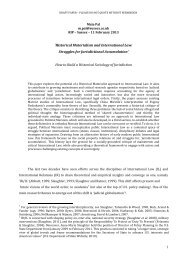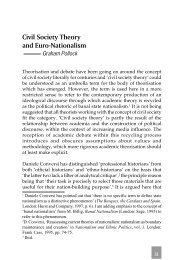Hannah Arendt's Concept of Responsibility - University of Sussex
Hannah Arendt's Concept of Responsibility - University of Sussex
Hannah Arendt's Concept of Responsibility - University of Sussex
You also want an ePaper? Increase the reach of your titles
YUMPU automatically turns print PDFs into web optimized ePapers that Google loves.
Herzog: <strong>Hannah</strong> Arendt<br />
For him, responsibility is not a burden and has nothing whatsoever to<br />
do with moral imperatives. Rather, it flows naturally out <strong>of</strong> an innate<br />
pleasure in making manifest, in clarifying the obscure, in illuminating<br />
the darkness. His affirmation <strong>of</strong> the public realm is in the final analysis<br />
only the result <strong>of</strong> his loving light and clarity (1968: 74-75). 7<br />
<strong>Responsibility</strong>, acting and suffering<br />
In ‘We Refugees’ as in The Origins <strong>of</strong> Totalitarianism, Arendt seemed to be<br />
assuming that belonging and acting are chronologically linked; that initiative,<br />
unrelated to a pre-existing law, is, nevertheless, related to something anterior<br />
to the action because ‘the place in the world’ - understood as a political or<br />
human world (Canovan, 1992: 105-12) - is a ‘framework where one is judged<br />
by one’s actions and one’s opinions’ (1979: 296-297). An agent will be held<br />
responsible for his/her words and deeds only if s/he belongs to a public<br />
sphere at the moment <strong>of</strong> his/her acts: ‘The disclosure <strong>of</strong> the “who” through<br />
speech, and the setting <strong>of</strong> a new beginning through action, always fall into an<br />
already existing web where their immediate consequences can be felt’ (1979:<br />
184). <strong>Responsibility</strong> in acting is apparently determined, or at least preceded,<br />
by fellowship. I am responsible in acting because I share a collective responsibility<br />
with my fellow-citizens. I am therefore responsible for my acts as they<br />
are determined by an existing group <strong>of</strong> people to whom I belong and for<br />
whose previous actions I am also responsible, and then I am responsible for<br />
beginning something radically new based only upon my own initiative.<br />
However, in The Human Condition and in later works, Arendt repeatedly argued<br />
that a political status is defined, or even created, by actions. One does not<br />
acquire a political presence and then begins to act. It is through actions that<br />
one reveals oneself as a political agent. It follows logically that an agent is<br />
someone who acts, and no one can be considered a political agent before acting.<br />
According to Honig, ‘[t]he unique political action, in Arendt’s account, is<br />
… the performative utterance, a speech act that in itself brings “something<br />
into being that did not exist before’” (1993: 99, see also Arendt, 1998: 178).<br />
The public sphere is created by performance-like speeches (or actions) (1993:<br />
153-154), and the essence <strong>of</strong> an action does not exist before the action is<br />
realised (Arendt, 1953: 81). Arendt emphasises the performative mechanism<br />
<strong>of</strong> actions, that is, the fact that actions are not predetermined or preconditioned,<br />
by alleging that they depend neither on general laws nor on personal<br />
interest but appear with their own principles such as glory, honour, excel-<br />
Studies in Social and Political Thought Page 43
















